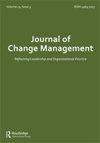Managing Change in Pluralistic Organizations: The Role of Normative Accountability Assumptions
IF 3
Q2 MANAGEMENT
引用次数: 6
Abstract
ABSTRACT Pluralistic organizations face the challenge of managing the co-existence of multiple sets of assumptions associated with each institutional logic. This multiplicity of assumptions problematizes the findings from the change management literature that for successful change management, the normative assumptions of the change initiative should be congruent with the organizational normative assumptions. One of the organizational mechanisms in which the normative assumptions are encoded and enacted is the system of accountability, hence in pluralistic organizations, there is a need to understand the role of the interplay of the normative accountability assumptions of the change initiative with the multiple sets of accountability assumptions representing individual logics within the organization. This study examines the case of a project to renew a strategic framework of a Canadian public university. The project diverged from the existing governance practices and their associated accountability assumptions that represented the institutional logic of managerialism. We found that this project was widely accepted, despite deviating from the institutional logic that supported existing practices, because its accountability assumptions were congruent with co-existing and deeply-rooted, democratic logic within the organization. Our findings contribute to the change management literature by highlighting the role of normative accountability assumptions in change management within pluralistic organizations.管理多元化组织中的变革:规范性问责假设的作用
多元组织面临着管理与每个制度逻辑相关的多组假设共存的挑战。这种假设的多样性使来自变更管理文献的发现出现问题,对于成功的变更管理,变更主动性的规范假设应该与组织的规范假设一致。规范假设被编码和制定的组织机制之一是问责制,因此在多元化组织中,有必要了解变革倡议的规范问责假设与代表组织内个人逻辑的多组问责假设之间的相互作用。本研究考察了一个加拿大公立大学战略框架更新项目的案例。该项目偏离了现有的治理实践及其相关的责任假设,这些假设代表了管理主义的制度逻辑。我们发现这个项目被广泛接受,尽管偏离了支持现有实践的制度逻辑,因为它的问责假设与组织内共存的、根深蒂固的民主逻辑是一致的。我们的研究结果通过强调规范性问责假设在多元化组织中的变革管理中的作用,为变革管理文献做出了贡献。
本文章由计算机程序翻译,如有差异,请以英文原文为准。
求助全文
约1分钟内获得全文
求助全文
来源期刊

JOURNAL OF CHANGE MANAGEMENT
MANAGEMENT-
CiteScore
6.60
自引率
20.00%
发文量
14
期刊介绍:
Journal of Change Management is a multidisciplinary and international forum for critical, mainstream and alternative contributions - focusing as much on psychology, ethics, culture and behaviour as on structure and process. JCM is a platform for open and challenging dialogue and a thorough critique of established as well as alternative practices. JCM is aiming to provide all authors with a first decision within six weeks of submission.
 求助内容:
求助内容: 应助结果提醒方式:
应助结果提醒方式:


